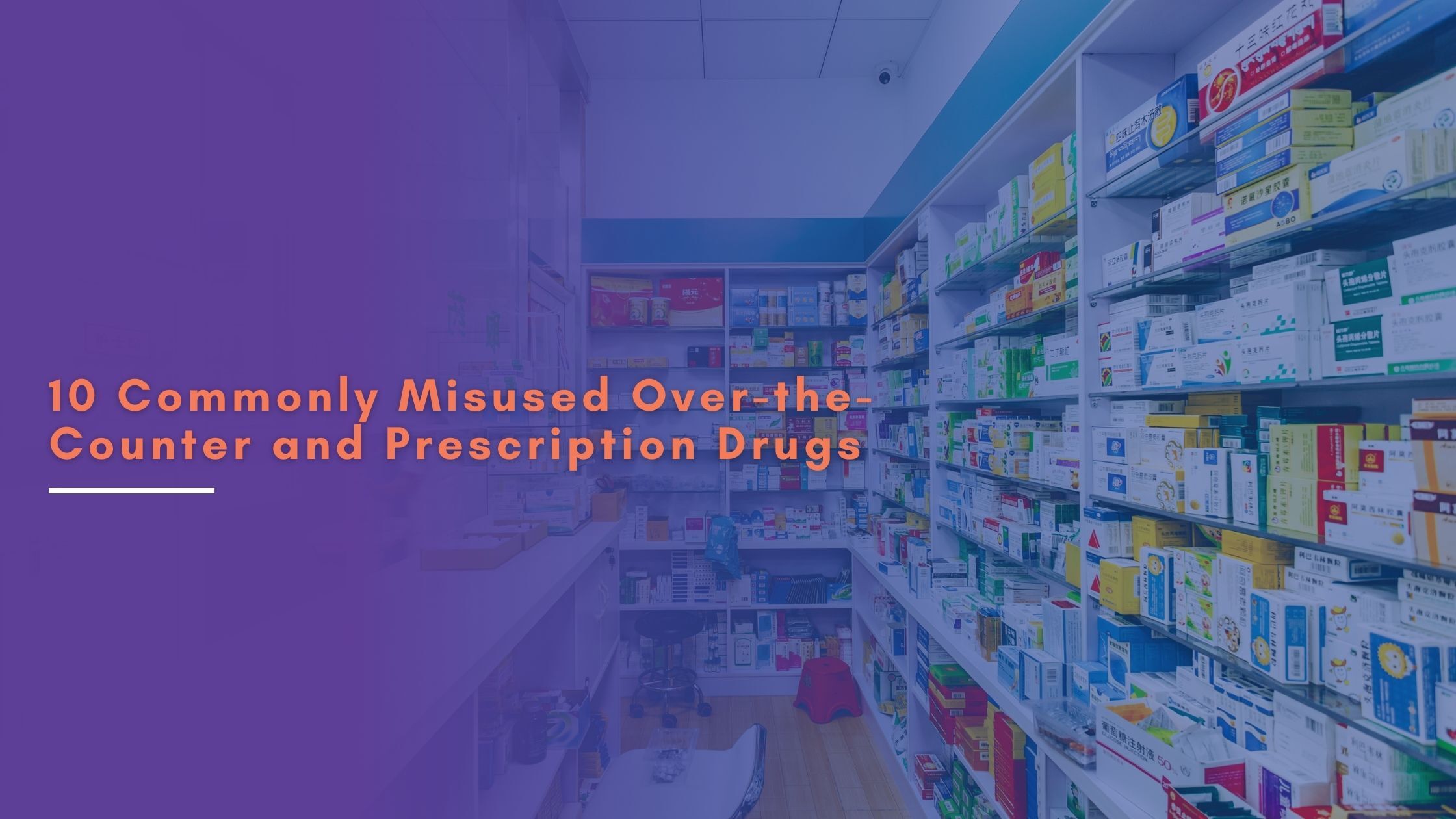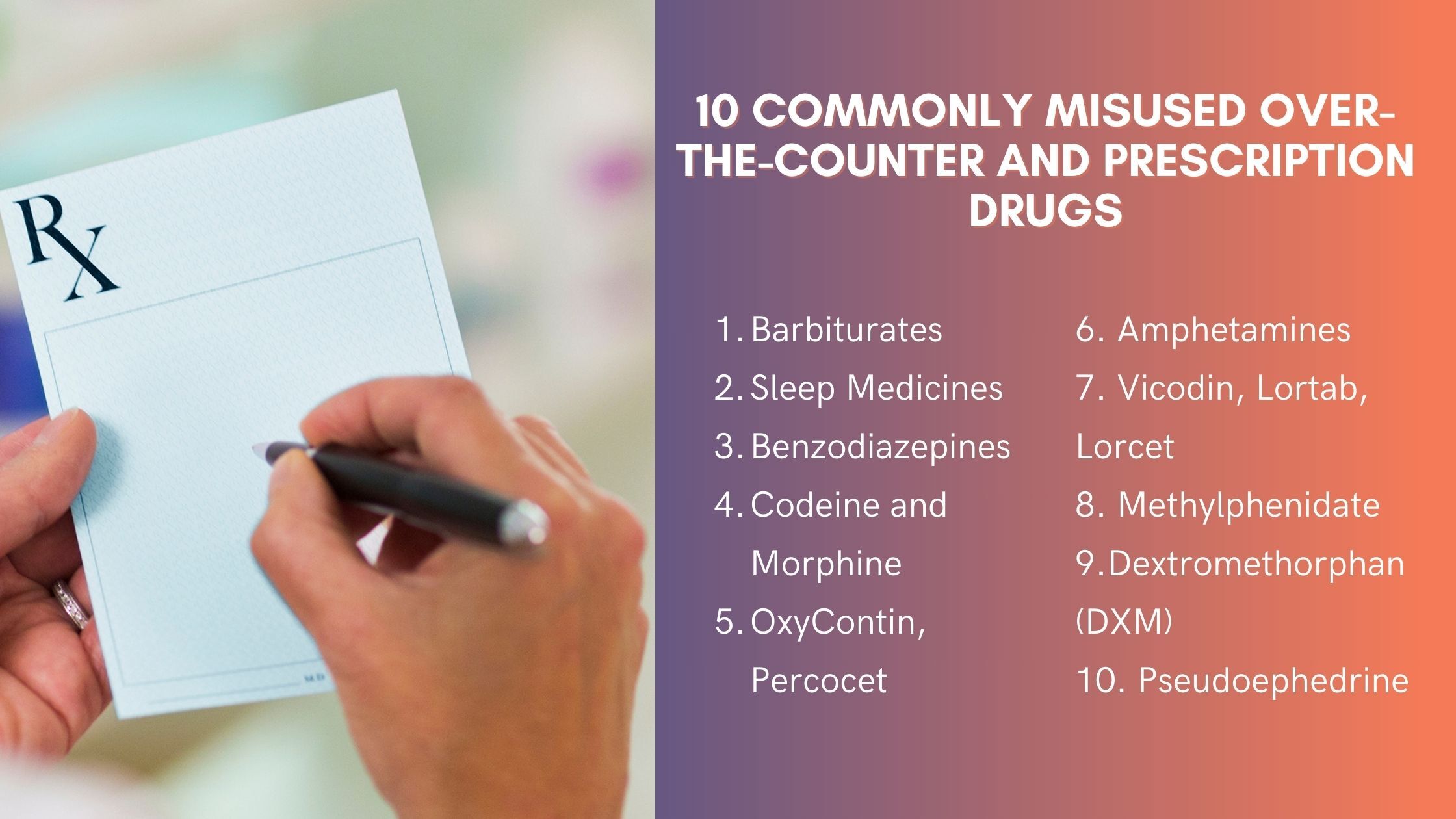We often think of drug misuse in terms of illegal substances. However, the misuse of both over-the-counter (OTC) drugs – medicines readily available without a prescription – and prescription medications is a growing concern worldwide.
These drugs, whether obtained with or without a prescription, are intended for treating various health issues, but they can have serious health implications when used improperly. This blog post aims to shed light on the 10 most commonly misused OTC and prescription drugs, their potential dangers, and how misuse can lead to addiction or other health problems.
Understanding these risks can help us make informed decisions about our health and well-being. Stay tuned as we discuss this critical topic.
The Dangers of Misusing OTC and Prescription Drugs
Both over-the-counter (OTC) and prescription drugs are commonly used to alleviate various ailments such as headaches, pain, colds, allergies, and heartburn. Examples include pain relievers like ibuprofen or prescription opioids, cold medicines like pseudoephedrine, and sleep aids like diphenhydramine or prescription benzodiazepines.
Despite their widespread availability and intended therapeutic purposes, both OTC and prescription drugs carry inherent risks when misused. Misuse can involve taking higher doses, using them more frequently, or for purposes other than those indicated on the label or prescribed by a healthcare professional.
This misuse can result in severe health consequences such as liver damage, gastrointestinal bleeding, and an elevated risk of cardiovascular events like heart attack or stroke. Moreover, misuse of certain prescription medications, particularly those with addictive properties like opioids or benzodiazepines, can lead to dependence and addiction.
Understanding these risks and using both OTC and prescription drugs responsibly is paramount to safeguarding our health and well-being.
Commonly Misused OTC and Prescription Drugs
Both over-the-counter (OTC) and prescription drugs, despite their accessibility and intended therapeutic purposes, can pose significant risks when misused. In this section, we’ll go over the ten most commonly misused OTC and prescription drugs, highlighting their potential dangers and consequences when used improperly.
1. Barbiturates
Barbiturates are central nervous system depressants often prescribed for anxiety and insomnia.
These drugs work by slowing down brain activity, promoting a calming effect. However, despite their legitimate medical uses, barbiturates can be dangerous when misused.
Misuse of these drugs, such as taking them in higher doses or without a prescription, can trigger adverse side effects. These include fatigue, mental confusion, and in severe cases, life-threatening withdrawal symptoms.
2. Sleep Medicines
Over-the-counter sleep medicines are readily available and commonly used by individuals struggling with occasional insomnia or irregular sleep patterns. These medications typically contain antihistamines, which are substances that induce drowsiness to help users fall asleep.
However, while they can be helpful for short-term sleep issues, misuse of these drugs is a serious concern. Regular or excessive use can lead to dependence, leaving users unable to sleep without them.
Additionally, misuse can result in persistent daytime drowsiness, negatively affecting productivity and daily functioning. In more severe cases, cognitive impairment can also occur, affecting memory and concentration.
3. Benzodiazepines
Benzodiazepines are a class of drugs primarily used in the medical field to treat conditions such as anxiety and sleep disorders.
They work by enhancing the effect of the neurotransmitter gamma-aminobutyric acid (GABA) at the GABA-A receptor, resulting in sedative, sleep-inducing, anxiolytic, anticonvulsant, and muscle relaxant properties.
Despite their therapeutic benefits, benzodiazepines carry a high risk of addiction, especially when misused or taken over extended periods.
The repercussions of such misuse can be severe, leading to physical withdrawal symptoms like tremors and seizures, cognitive issues like memory problems, and emotional instability, including increased feelings of depression, anxiety, and irritability.
4. Codeine and Morphine
Codeine and morphine are well-known opioid analgesics, powerful medications utilized in the healthcare field for the management of moderate to severe pain. They work by interacting with specific receptors in the brain to block pain signals.
However, these drugs also carry a high risk of misuse due to their potent euphoric effects. Misuse can lead to addiction, a chronic disease characterized by uncontrollable drug-seeking behavior.
Additionally, misuse can result in severe respiratory distress and even fatal overdose, highlighting the importance of proper usage and monitoring.
5. OxyContin, Percocet
OxyContin and Percocet are well-known prescription painkillers that contain oxycodone, a potent opioid used to treat severe pain. These medications are typically prescribed for short-term use following surgeries or injuries, or for chronic pain management.
Despite their medical benefits, they carry a high risk of misuse due to their potential for producing euphoria. When misused, these drugs can lead to addiction, characterized by uncontrollable craving and compulsive drug use.
Misuse can also result in severe withdrawal symptoms when the drug is stopped abruptly, and in extreme cases, can lead to potentially fatal overdoses.
6. Amphetamines
Amphetamines are a class of stimulant drugs that are commonly prescribed for the treatment of Attention Deficit Hyperactivity Disorder (ADHD). These medications work by increasing the levels of certain chemicals in the brain which help to enhance focus and energy levels.
Despite their therapeutic benefits, amphetamines have a high potential for misuse due to their ability to produce feelings of euphoria.
Misuse of these drugs can lead to a range of serious health issues including heart problems such as arrhythmias and heart attacks, mental health problems like psychosis, and physical dependence characterized by withdrawal symptoms when the drug use is stopped.
7. Vicodin, Lortab, Lorcet
Vicodin, Lortab, and Lorcet are potent prescription medications that contain hydrocodone, a powerful opioid used in the medical field to manage severe pain.
That notwithstanding, these drugs have a high potential for misuse due to their euphoric effects. Misuse of these medications can lead to serious consequences such as addiction, which is characterized by compulsive drug-seeking behavior, severe withdrawal symptoms when the drug use is abruptly stopped, and even life-threatening overdose.
8. Methylphenidate
Methylphenidate is a central nervous system stimulant that’s often prescribed for Attention Deficit Hyperactivity Disorder (ADHD) due to its ability to increase dopamine levels in the brain, thereby improving focus and reducing impulsivity.
This prescription drug carries a risk of misuse, especially given its stimulating effects. Misuse of methylphenidate can lead to serious health complications such as addiction, which is characterized by a compulsive need to use the drug, heart problems including irregular heartbeat and high blood pressure, and severe psychological effects like paranoia and hallucinations.
9. Dextromethorphan (DXM)
Dextromethorphan, often abbreviated as DXM, is a common ingredient found in numerous over-the-counter cough medicines. It’s important to note that while beneficial in treating coughs, DXM can have psychoactive effects if consumed in large quantities.
Misuse of DXM can lead to severe consequences, including hallucinations, loss of motor control, and in extreme cases, it can even cause brain damage. Therefore, responsible use is strongly advised.
10. Pseudoephedrine
A decongestant found in many OTC cold medicines, pseudoephedrine can be used to make illegal drugs. Misuse can lead to irregular heartbeat, high blood pressure, and seizures.
Pseudoephedrine’s potential for misuse stems from its ability to be chemically altered into methamphetamine, a powerful and illegal stimulant. This has led to strict regulations in many countries regarding the sale and distribution of products containing pseudoephedrine. Despite these measures, the legitimate therapeutic benefits of pseudoephedrine, such as its effectiveness in relieving nasal congestion, ensure its continued availability as an over-the-counter medication. However, its purchase is often monitored or restricted to mitigate the risk of illicit use, balancing the need for accessible medical treatment with the imperative of controlling drug misuse.
Don’t Let Misuse Become a Silent Struggle
The misuse of over-the-counter and prescription drugs can often be a silent struggle, overshadowed by the misconception that these medications are always safe due to their accessibility. But the truth is, addiction doesn’t differentiate between prescription drugs and over-the-counter medications. It’s a battle that can be equally challenging and dangerous.
At Crest View Recovery Center, we understand the unique challenges of overcoming addiction to OTC and prescription drugs. Our compassionate team of experts is dedicated to providing personalized care and comprehensive treatment strategies that address not just the addiction, but the underlying issues that led to it.
Take the First Step Towards a Healthier You
Taking the first step can be the hardest part, but it’s also the most crucial. By reaching out to Crest View Recovery Center, you’re not just seeking help; you’re taking control of your life and embarking on a journey towards a healthier, happier you. Our center offers:
- Expert Guidance: Our team consists of skilled professionals who specialize in addiction recovery. They provide not only medical support but also emotional and psychological assistance throughout your journey.
- Tailored Treatment Plans: We understand that every individual is unique. That’s why our treatment plans are tailored to meet your specific needs, ensuring the most effective path to recovery.
- A Supportive Community: Recovery is not a journey you have to undertake alone. At Crest View Recovery Center, you’ll find a community of individuals who understand your struggles and will support you every step of the way.
Contact Us Today
Your journey to recovery starts with a simple yet powerful step: reaching out for help. Contact Crest View Recovery Center today at (866) 986-1371, or fill out our online contact form to book an appointment. Remember, recovery is not just about overcoming addiction; it’s about reclaiming your life and discovering a new path filled with hope and possibilities. Your new beginning starts here.



